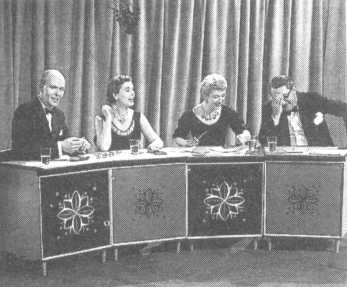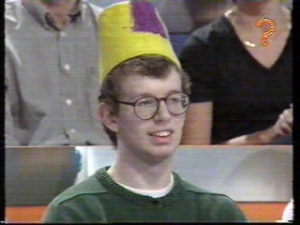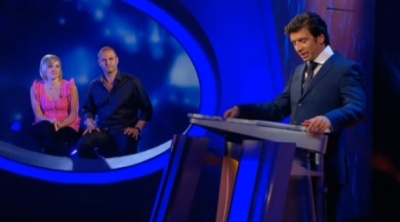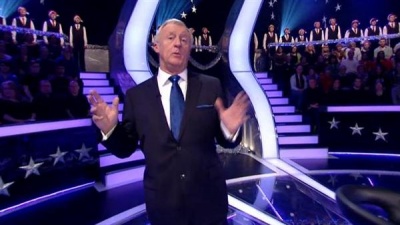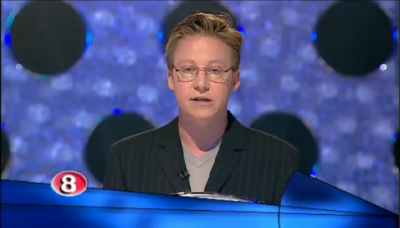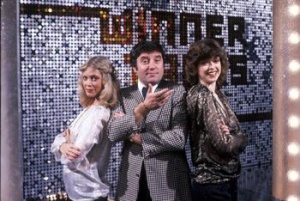Weaver's Week 2024-12-15
(Created page with 'Last week | Weaver's Week Index | Next week Our summer filler series eases gently towards its inevita…')
Newer edit →
Revision as of 09:40, 15 December 2024
Last week | Weaver's Week Index | Next week
Our summer filler series eases gently towards its inevitable conclusion. We're recording every game show to have had at least 500 episodes from 1924 to 2023, or at least 100 primetime episodes. Some near misses and interesting diversions on the way, too.
Let's start with something you don't see on lesser, innocent wikis.
Which game shows have the most episodes? Part 20: V-W
BBC The Voice of This Territory
The amazing spinny chairs first appeared on screen in 2012, and have been by far the most successful part of the show. Singers have come, singers have gone, gimmicks like the Battles and Knockouts and Callbacks have drifted through. Just two things have remained: will.i.am in the leftmost chair, and the way they've literally only found one successful star: Becky Hill, who had to go off and re-invent herself before achieving commercial success.
The Voice began on BBC1, was poached by ITV after they took over production company Talpa, and has not missed a year since. Spin-off series included Louder on Two with Zoe Ball, The V Room with Vick Hope, and Barkstage with Hacker T Dog. (Where is this series on That Other Wiki's page? It's meat paste erasure, that's what it is!)
158 main show episodes to the end of last year, plus 15 Louder on Two, 14 Barkstage, and 58 V Room episodes – the latter two spin-offs were not primetime broadcasts. There were also 41 episodes across seven Voice Kids series. That's a total of 214 primetime episodes, and 286 episodes in total.
The Wall was Danny Dyer's massive programme of dropping balls. Absolutely huge when it launched, and then vanished without trace: just 37 primetime episodes. We'll have to file it alongside well-loved cult show Wanted, 16 primetime episodes.
Watercolour Challenge was a pleasant half-hour painting outdoors. 230 daytime episodes.
The Weakest Link
Contestants vote each other out, as though that is going to solve their problems. No, to truly break the shackles of The Man, contestants need to rise in rebellion and depose the hated leader Anne Robinson. Otherwise she will get delusions of adequacy and might go on to wreak further crimes against television!
Link was a massive phenomenon when it launched, and slowly faded into the background over the coming years. The original run – from August 2000 to March 2012 – claimed 1693 episodes; we haven't been able to verify this number, thanks in part to Radio Times not distinguishing repeats, but it feels about right. A one-shot revival in 2017 was an error; another with new host Romesh Ranganathan has proven more successful.
If we've counted correctly, there were about 220 primetime episodes in the original run – most of them celebrity editions on Saturday night, but some slotted into weeknights. Some of these episodes commissioned for primetime may have been shown in daytime slots; similarly, some daytime episodes may have sneaked into primetime. We're certain that 32 revival episodes have aired in primetime to the end of last year, giving totals of 1725 episodes and about 252 primetime episodes.
We are the Champions saw Ron Pickering tour the leisure centres and have a massive PE day. Ran on children's television for 112 episodes plus 5 in a revival for Sport Relief.
We Beg to Differ asked eternal questions. "Do women dress to please their husbands, other women, or themselves?" Six radio personalities of the day – Joyce Grenfell and Kay Hammond and two other women, John Clements and The Radio Doctor representing blokes – discuss the differences between women and men, Horatio and his Emma, Socrates and Xanthippe (as the Rusty Old Radio Times put it). 81 primetime episodes on radio, 8 on telly; a revival in 1966 wasn't on primetime radio.
What's My Line?
Eamonn Andrews asks the panel – typically David Nixon, Isobel Barnett, Barbara Kelly, and Gilbert Harding – to work out what exactly he does to be paid such huge amounts by the BBC. Some guests made sure the programme had variety.
A never-ending supply of interesting jobs ensured What's My Line? ran for over a decade, with a long revival in the 1980s. We make it 437 primetime episodes, and 640 episodes in total.
The Wheel just feels like it's been around forever. 43 primetime episodes up to the end of last year, and another dozen since.
Wheel of Fortune (2)
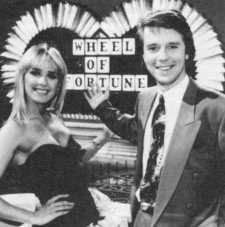 Carol Smillie and Nicky Campbell, from the days before they invented colour film. (STV)
Carol Smillie and Nicky Campbell, from the days before they invented colour film. (STV)Nicky Campbell, the smartest and suavest host around, introduces Big Money Hangman for the Ninety Per Cent. Contestants spin a giant wheel, call out some letters, and try to solve a patronisingly easy puzzle. It's to the contestants' benefit to keep spinning and rack up lots of points, so they play on long after every viewer at home has solved the puzzle.
Ran in primetime from 1988 to 1998 (212 episodes), then John Leslie took it to the wilderness of daytime where it rotted and died (but not until it had had 540 more episodes). Reports and rumours of a revival are surely just dust in the wind: they could never bring back Wheel of Fortune. 212 primetime episodes and 752 episodes in total.
Whittle
Back in part six, we promised to revisit Everybody's Equal and its 17 primetime episodes. The time has now come.
100 people go into a Channel 5 studio along with Tim Vine. They'll be asked questions, invited to put on Whittle masks, and could potentially win as much as £23.53. Hosted with Tim Vine's usual style and groansome puns.
Went out at 6pm, so 130 primetime episodes here, plus the earlier series hosted by Chris Tarrant, giving the format a total of 147 primetime episodes.
Who Dares Wins
Bid to control a list of things – sports teams, films, geography, entertainment. Complete two bids to win the game and qualify for the money list, and the chance to earn up to £50,000.
A solid format, Who Dares Wins could and would go anywhere in any edition, including the time when they used our entire A-Z as a category. Move over Match of the Day, this column naming 1000 game shows is the stuff Saturday nights were made for. Nick Knowles hosted from 2007 to 2019, and recently revived on RTÉ hosted by Baz Ashwamy. 107 primetime episodes.
Who Wants to be a Millionaire
Fifteen questions, a million pounds, and one of the most successful television shows ever made.
Chris Tarrant guides a single player through some general knowledge questions. The answer is always on screen, there are helping lifelines to be had, but most of the time it's down to the player's knowledge. Ran from 1998 to 2014, with 592 primetime episodes. Plus one episode and two documentaries about the coughing incident, three documentaries, and six retrospective "whatever happened to..." docs.
A revival is thought possible, and a similar show – hosted by some privately-educated old duffer – has been clogging up the schedules since 2018. Grand total of 678 primetime episodes.
Whose Line is it Anyway?
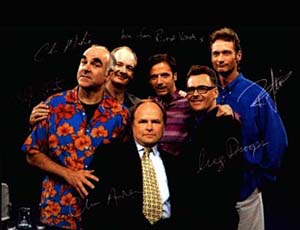 A set of Liners: clockwise from left: Stephen Frost, Colin Mochrie, musician Richard Vranch, Greg Proops, Ryan Stiles, host Clive Anderson. (Hat Trick Productions)
A set of Liners: clockwise from left: Stephen Frost, Colin Mochrie, musician Richard Vranch, Greg Proops, Ryan Stiles, host Clive Anderson. (Hat Trick Productions)Improvisation comedy. Clive Anderson gives a group of shiny young players (Ryan Stiles, Josie Lawrence, Greg Proops, Mike McShane, Paul Merton, Dame Sandi Toksvig) silly things to do. Points were awarded at the chairman's discretion.
Began on Radio 4, then flew to Channel 4 where it remained for the next decade. The American version has been in production ever since, ours got 137 primetime episodes and 144 episodes in total.
Wife of the Week
Christopher Biggins hosted an "ironic" "cool" deconstruction of gender roles for BSB's Galaxy channel. Following the hostile takeover by KYTV, the exact same show went out on The Satellite Channel where they used it to reinforce gender roles.
105 primetime episodes on Galaxy, and at least 100 when it moved to KYTV. We'll credit 205 primetime episodes.
Win, Lose or Draw needs a revival. How else are we going to squeeze in Waistcoat Wednesday, a drawing of Richard Osman's House of Games, and Bob Mills' relentless deconstruction of the Patronisingly Easy Call-And-Lose contest. But only 381 main series episodes, 13 teen editions, and 20 Late shows, so we can't get the total above 414 episodes. Hmph. Only a doodle'll do.
Winning Lines
Let's meet the 49ers.
Absolute genius, this show. Take 49 members of the public, bring them down to London at vast expense, then ask a few questions with numbers as answers to bring six players down. (And use the last digit of their playing number to help select next week's players).
Reduce the six to one through some more quick-fire questions. And then have the winner play The Wonderwall, 49 questions with an associated number. Three minutes to answer questions and call out the numbers, and the more you get right the further the flight.
Hosted – and made simple – by the television genius that was Simon Mayo; successor Phillip Schofield was just as adept though infinitely less cool. 81 shows, plus 22 Wonderwall finales played on the Wednesday night. That's a total of 103 primetime editions.
Winner Takes All
A general knowledge quiz, with the sneaky conceit that it's also a bit of a gamble.
Players hear a question, and stake some of their points on how confident they are to get the answer. Only, rather than the prosaic "A B C D" the options have betting odds: 2/1, 3/1, 5/1, 10/1. Whoever's got the most points from each heat goes through to the final, where they play for cash.
Jimmy Tarbuck hosted the show, but the real star was Geoffrey Wheeler. "A difference of opinion, Jimmy" as the contestants picked different answers.
Ran from 1975 to 1987 in primetime (188 episodes), then a pleasant daytime series in 1988 (60 episodes). Revived on the Challenge channel in 1997 (65 primetime episodes), and we're surprised it's not come back since. 253 primetime episodes, and 313 episodes in total.
Words in Music might be the worst excess of James Boyle. The Radio 4 "controller" completely re-arranged the scheduled in 1998, to suit his preferences and tastes, and damn the listener. One of Boyle's personal loves was the completely dull panel game, and he had one every single lunchtime. Words in Music was the classical music quiz Counterpoint turned up so highbrow that even Radio 3 listeners thought, "that's a bit obscure". The opening question: hear a clip of music, say what opera it's from, what is happening on the stage, and which characters are to be seen. Eleven episodes of this, while listeners thought, "maybe that Jimmy Young show isn't so bad after all".
World's Strongest Man
Thirty or so enormous blokes from around the world lift rocks, pull trains, hold up vans full of gold bricks, and suchlike. The golden age was of course the 1980s, when it made a hero out of canary breeder and two-time world champ Geoff Capes.
First three editions weren't shown here (or if they were, they were buried in World of Sport and we've lost them). Two shows on Thames before Strongest Man became a reliable fixture on BBC1 around Christmas for 22 years. Four years on Channel 5, during which time there were (gasp!) heats, before an ill-starred move to the Bravo channel. WSM has been back on Channel 5 since 2011, and added Giants Live qualifying matches during the run-up to the contest. There was also a World's Strongest Woman televised in the early aughts.
The show has (er) gone from strength to strength, we certainly wouldn't want to rub it the wrong way. 183 primetime episodes.
Would I Lie to You? (2)
Celebrity fibbage: did the panelists really do this outlandish thing? Is it true that Jo Brand once left half a cake on her plate? That the young Claudia Winkleman tried to knit her own turtle neck? That original host Angus Deayton appeared on a record spoofing Frankie Goes to Hollywood? 139 primetime episodes to the end of 2023.
This brings us suspiciously close to a final score. We'll wrap this feature up next week.
In other news
The big knit Tom Daley is to add another game show to his collection. The Splash! co-host will front Game of Wool, a competitive knitting championship to be shown on Channel 4. Eight episodes, some time next year.
Quizzy Mondays
The Torres Strait, between Australia and New Guinea. That'll earn Anthony Fish the rarest of starts on BBC Brain, Five In a Row And A Bonus Mark, only the second week in a row this has happened. Vicky Johnson gets four in a row, but misses the symbolism in the flag of Estonia. Strong performances from all the other players in the second round, lots of good answers so it's 7-7-7-6 going into the Beat the Brains interlude.
Anthony Fish comes within a whisker of another Five in a Row (etc) but can't quite recall the month when United Nations day falls. Andrew Fisher comes with a moment of his Five in a Row, but doesn't remember that "Dunelm" indicates a graduate from Durham Uni. Shanine Salmon remembers a lot of things across the show, but never more than three on the spin. When the final scores are totted up, it's Anthony Fish who wins the semi-final, two clear of Andrew Fisher.
Dom Tait won on Mastermind, taking his specialist round on polyfactual newsorama The Day Today (and its radio bretheren On the Hour). Dom was bested on Specialist by Jeff Davies, who secured a Perfect Round on Sylvia Townsend Walker, but a flabbergasting score of 16 on general knowledge ensured Dom was straight to the semis.
Al Frescans booked their place in the Only Connect last eight, running away with it in Missing Vowels after a toe-to-toe match with the Hopsters. Key moment might have been the Frescan's guess of the largest dollar economies, which they hadn't looked like getting but earned them a useful couple of points to stay in the game.
Open were all over Durham in University Challenge; after leaping to a massive lead early on, Durham were gently reeled in by Open's superior buzzing and general approach to the buzzers. Open were visibly shaken as the first eight bonuses were dropped; once they'd got one right, nerves were settled and the team visibly moved up a gear. A lot of fine art and science this week, neither of which had been strong subjects for Durham, and a complete lack of Philosophy Politics Religion and Other Assorted Thinkpieces.
This week's thrills: Countdown is always immaculately turned out, and always has the most intellectual guests (C4, weekdays). Christmas specials of Scotland's Home of the Year (BBC1 Scotland, Mon), Wales' Home of the Year (BBC1 Wales, Thu), QI (BBC2, Tue), Popmaster tv (More4, Tue), and Sewing Bee (BBC1, Thu). New series of drama Itopia advances the Prosiect Z backstory further (S4C, weeknights).
Next Saturday brings us a Strictly nostalgia trip, plus specials of The Wheel and The Weakest Link. Channel 5 begins World's Strongest Man with the domestic heats; it's on through to New Year.
To have Weaver's Week emailed to you on publication day, receive our exclusive TV roundup of the game shows in the week ahead, and chat to other ukgameshows.com readers, sign up to our Google Group.



